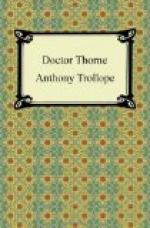‘My father I hope will approve of it,’ said he. ’That my mother should disapprove of it is a misfortune which I cannot help; but on this point I will take no answer from my father or mother; the question is one too personal to myself. Mary, if you say that you will not, or cannot return my love, I will go away;—not from here only, but from Greshamsbury. My presence shall not banish you from all that you hold dear. If you can honestly say that I am nothing to you, can be nothing to you, I will then tell my mother that she may be at ease, and I will go away somewhere and get over it as I may.’ The poor fellow got so far, looking apparently at the donkey’s ears, with hardly a gasp of hope in his voice, and he so far carried Mary with him that she also had hardly a gasp of hope in her heart. There he paused for a moment, and then looking up into her face, he spoke but one word more. ‘But,’ said he—and there he stopped. It was clearly told in that ‘but’. Thus would he do if Mary would declare that she did not care for him. If, however, she could not bring herself so to declare, then was he ready to throw his father and mother to the winds; then would he stand his ground; then would he look all other difficulties in the face, sure that they might finally be overcome. Poor Mary! the whole onus of settling the matter was thus thrown upon her. She had only to say that he was indifferent to her;—that was all.
If ‘all the blood of the Howards’ had depended upon it, she could not have brought herself to utter such a falsehood. Indifferent to her, as he walked there by her donkey’s side, talking thus earnestly of his love for her! Was he not to her like some god come from the heavens to make her blessed? Did not the sun shine upon him with a halo, so that he was bright as an angel? Indifferent to her! Could the open unadulterated truth have been practicable for her, she would have declared her indifference in terms that would truly have astonished him. As it was, she found it easier to say nothing. She bit her lips to keep herself from sobbing. She struggled hard, but in vain, to prevent her hands and feet from trembling. She seemed to swing upon her donkey as though like to fall, and would have given much to be upon her own feet in the sward.
‘Si la jeunesse savait . . .’ There is so much in that wicked old French proverb! Had Frank known more about a woman’s mind—had he, that is, been forty-two instead of twenty-two he would at once have been sure of his game, and have felt that Mary’s silence told him all he wished to know. But then, had been forty-two instead of twenty-two, he would not have been so ready to risk the acres of Greshamsbury for the smiles of Mary Thorne.
‘If you can’t say one word to comfort me, I will go,’ said he, disconsolately. ’I made up my mind to tell you this, and so I came over. I told Lady Scatcherd I should not stay—not even for dinner.’
‘I did not know you were so hurried,’ said she, almost in a whisper.




